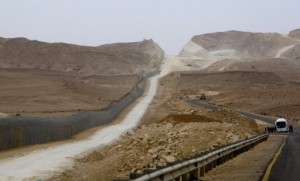
During an Iftar dinner at an army checkpoint near Rafah last night, a number of gunmen attacked soldiers as they broke fast, reportedly killing 13 and wounding several others as they also stole two military vehicles in the process of one of the most deadly and brazen attacks at the Israeli border in recent history.
Ahmed Abo Thera, a Sinai Bedouin activist said that he had been to the scene. “I’ve seen a bloodbath. There was a group of 25 soldiers having Iftar when they were attacked. The attackers showed up in “three Land Cruisers and used heavy weapons,” said Abo Thera.
The death toll left behind has varied according to differing reports ranging between 13 and 20. Egypt’s official MENA news agency reported an assault by “unidentified armed men” on a checkpoint in the Al-Massura area of the Sinai and an exchange of fire with security forces. MENA confirmed that border guards had been killed, but did not mention how many.
According to the French News Agency AFP, unidentified gunmen killed at least 13 guards before stealing armoured vehicles and crossing into Israeli territory, where they were attacked by a helicopter. Israeli military spokeswoman Lieutenant Colonel Avital Leibovich told reporters gunmen hijacked two vehicles from an Egyptian outpost where they killed between 10 and 15 border guards before crossing the frontier. She said the Israeli military was searching for any remaining gunmen after one of the vehicles exploded by itself and the other was destroyed from the air. She did not know how many had been onboard the vehicles and if any had survived.
While Abo Thera confirms the attackers did get a hold of two armoured vehicles and adds that the vehicles were taken by the attackers to the Karm Abo Salem crossing near the Israeli border where one was destroyed, he says it is still not known whether it was destroyed by the Israeli army or the attackers themselves.
Ammar Jooba spokesperson of 6 April (Ahmed Maher) in North Sinai on the other hand, denies that the attackers took hold of the armoured vehicles. “They only tried to escape to Israel but they failed to do so. They have not been arrested yet,” Jooba said. Jooba does however expect the situation on the border to worsen. “There are increasing security measures on the part of both the Israeli and Egyptian army. A confrontation is expected,” he said.
This latest attack only marks the most recent incident in the highly unstable Peninsula. “Similar attacks, targeting military checkpoints ,happen all the time. This one is just more violent. But there was a similar attack in Al-Arish last week,” stated Jooba. Jooba described how the situation in Sinai has already been tense. “There is no police in Sinai and even when they are there, they are never ready to for confrontations.”
While both the police and the army are tasked with securing the peninsula, it seems that they are failing to do so. “The security situation in Sinai is the same way it is elsewhere in the country. Robberies are widespread and kidnappings occur often,” said Mohammed El-Beak, an activist in the 6 April (Ahmed Maher) of North Sinai.
Activist Abdel-Rahman El Masry also from the movement confirmed police were not doing much in Sinai. “They don’t deal with anyone. Last week there were repeated incidents of blocking roads by people over water cuts. The police is too lenient with them,” he added.
But police were not lenient in the past. During ousted president Hosni Mubarak’s era, police and residents of Sinai had a tense relationship. Many were handed harsh sentences in absentia for not cooperating with the police, according to activists.
Correction: The activists Mohamed El-Beak, Ammar Jooba and Abdel-Rahman El Masry previously referred to as members of 6 April Democratic Front are not. They are members of 6 April (Ahmed Maher).

